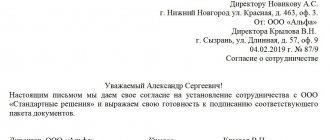K.A. Pechko, notary of the Shchelkovsky notarial district of the Moscow region
annotation
The first issue considered in the work is the need for a notary to request the notarial consent of the former spouse when disposing of joint property acquired during marriage. To answer, the ruling of the Supreme Court of the Russian Federation is analyzed. The second issue under consideration is the possibility of revoking the notarial consent of the spouse.
Key words: joint property, consent of the former spouse, cancellation of the notarial consent of the spouse.
On assent of a former spouse and the possibility of cancellation the spouse's assent
K.A. Pechko
Annotation
The first issue examined in the paper is the necessity of reclaiming the asset of the former spouse by the notary, when disposing the joint property acquired during marriage. In order to answer this question the determination of the Supreme Court will be analyzed. The second problem to be discussed is the cancellation of the notarized assistance of the spouse.
Key words: joint ownership, the asset of the former spouse, the cancellation of the notarized asset of the spouse.
The mode of common property of spouses is joint property. This regime is more stringent than common shared ownership, since the disposal of jointly owned property is carried out by agreement of all participants in joint ownership. Although the Civil Code obliges all participants in civil legal relations to act in good faith, it is obvious that in practice, the disposal of common property does not always occur by mutual consent of the former spouses. In this regard, an important question, in my opinion, arises: is the consent of the former spouse in notarial form necessary for the disposal of property? Moreover, the Decree of the Supreme Court of the Russian Federation of 2011 emphasizes the important role of notarial consent, which will also be discussed below.
conclusions
- If the marriage has been dissolved and there is property registered in the name of one of the spouses, then do not be lazy, draw up an agreement on the division of jointly acquired property or divide it in court. Of course, Rosreestr does not yet carry out transactions in the absence of such consent even from the ex-spouse, but how long this will last is unknown, and, as we see, there is no such ban in essence.
- Buyers, acquirers - do not agree to a transaction without the notarized consent of even your ex-spouse to dispose of the property.
Is the consent of the ex-spouse in notarial form required to dispose of property?
First, it must be said that the regime of common joint ownership of spouses in jointly acquired property does not cease after the divorce. Also, the regime of common joint ownership by itself is not transformed into a regime of common shared ownership (there is an opinion to the contrary). This conclusion follows from the analysis of Articles 38 and 39 of the Family Code of the Russian Federation (hereinafter referred to as the RF IC), and the Supreme Court of the Russian Federation adheres to the same position.
Does the norm of paragraph 3 of Article 35 of the RF IC on the need for notarial consent when disposing of property by former spouses apply? The position of the Supreme Court of the Russian Federation in the Ruling dated January 14, 2005 in case No. 12-B04-8 is as follows: “The norms of Article 35 of the RF IC apply to legal relations that have arisen between spouses and do not regulate relations that have arisen between other participants in civil transactions ( that is ex-spouses . - Author's note). Article 253 of the Civil Code of the Russian Federation should be applied to these legal relations, according to paragraph 3 of which each of the participants in joint ownership has the right to enter into transactions for the disposal of common property, unless otherwise follows from the agreement of all participants. A transaction related to the disposal of common property made by one of the participants in joint ownership may be declared invalid at the request of the remaining participants on the grounds that the participant who made the transaction did not have the necessary powers only if it is proven that the other party to the transaction knew or obviously should have know about it." Based on the above, we have to admit that, according to the Supreme Court of the Russian Federation, the notarized consent of the former spouse is not required.
How should a notary act in practice? Let's try to figure it out. The disposal of jointly owned property is carried out by the consent of all participants, which is assumed regardless of which of the participants makes the transaction to dispose of the property. The consent of the former spouse is assumed, but the notary is obliged to explain to the owner that he can act with the consent of the second co-owner, so that actions to dispose of the property do not lead to a violation of the rights of the former spouse and the owner who enters into an alienation agreement is not sued by the former spouse. At the same time, all these circumstances become known to the purchaser in the notary’s office. Thus, the transaction can only be certified if the owner clearly confirms that he is acting with the consent of the former spouse. Otherwise, there are two conditions for recognizing the transaction as invalid, indicated in paragraph 3 of Article 253 of the Civil Code (hereinafter referred to as the Civil Code of the Russian Federation): the consent of the spouse has not been obtained, and the acquirer knows about this before concluding the contract, since the notary is obliged to clarify these issues from the parties to the transaction before certificate of the contract.
If the notary who certified the contract did not explain to the parties the necessary conditions for concluding the contract, a claim may be brought against the notary. Such a claim could be a claim by a former spouse against a notary who did not explain to the owner the need to obtain the consent of the former spouse. It may also be a claim by the title owner who has suffered losses as a result of a claim brought against him by a former spouse. Or a claim by a buyer who knew about the disagreement of the seller’s ex-spouse, but did not pay attention to this, as a result of which the transaction was declared invalid. In such a situation, the owner’s statement that there is no spouse who would have the right to the common property, which formally allows the agreement to be certified, will in fact indicate that information was hidden from the notary or the notary did not clarify the question of whether jointly owned property.
The grounds for challenging a transaction, provided for in paragraph 3 of Article 253 of the Civil Code of the Russian Federation, disappear if there is the consent of the former spouse in writing, this can be an application submitted to a notary by the former spouse, and a notarized consent. The notary decides on his own whether it is necessary to request such a document. If for some reason it is not possible to obtain consent in writing, it is recommended to indicate in the contract a clause stating that the alienation of property occurs with the consent of the co-owner, and the acquirer is explained the grounds for recognizing the transaction as invalid in accordance with paragraph 3 of Article 253 of the Civil Code of the Russian Federation.
It is important to remember that the statute of limitations for a voidable transaction begins to run when a person learns that his right has been violated, and the ex-spouse may find out that his right has been violated after a long period of time.
It should be noted: according to E.A. Krasheninnikov, “an order of a co-owner requiring consent, like any transaction requiring consent, is not valid until consent is given. It does not cause the legal consequences that the owner wanted, which excludes the possibility of challenging it, since challenging a transaction consists of canceling the legal consequences caused by it.” In practice, courts, including the Supreme Court of the Russian Federation, on the basis of paragraph 3 of Article 253 of the Civil Code of the Russian Federation, consider the disposal of joint property made by one of the co-owners without the consent of the other co-owners (which is known to the counterparty of the disposer) as a voidable transaction.
On the importance of consent
In practice, there are cases when the notarized consent of the spouse is not formalized, while this is necessary in accordance with paragraph 3 of Article 35 of the RF IC. Some notaries do not formalize the consent of the spouse for the acquisition of real estate, believing that consent is required only for the alienation of real estate. It should be noted that paragraph 3 of Article 35 of the RF IC is not about the alienation of real estate, but in general about the disposal of real estate.
The ruling of the Supreme Court of the Russian Federation dated December 6, 2011 No. 67-B11-5 noted the important role of the notarial consent of the spouse in cases where such consent is mandatory: the obligation of the spouse who applied to the court is not provided for to prove that the other party to the transaction completed one of the spouses without the notarized consent of the other spouse, knew or should have known about the absence of such consent. This conclusion was made by the Supreme Court based on the following reasoning. To recognize a transaction as invalid, paragraph 3 of Article 253 of the Civil Code of the Russian Federation establishes the obligation to prove that the other party to the transaction knew that the participant in joint ownership who completed the transaction did not have the necessary powers. However, paragraph 4 of Article 253 of the Civil Code of the Russian Federation establishes that the rules of Article 253 of the Civil Code of the Russian Federation are applied insofar as this Code or other laws do not establish otherwise for certain types of joint ownership, and paragraph 2 of paragraph 3 of Article 35 of the RF Civil Code does not provide for such an obligation.
Following the logic of the said Supreme Court Ruling, a transaction can be declared invalid by the court only on the grounds that consent was not obtained in notarial form, when such notarial consent is mandatory. Since the transaction is voidable, the spouse may find out that his right has been violated and go to court after a long period of time, which can lead to even greater losses for the parties to the contract. Thus, any of the parties to the contract may bring a claim against the notary for damages. In conclusion, I will cite the opinion of the head of Rosreestr Natalya Nikolaevna Antipina: “In connection with the abolition of the requirement for state registration of agreements on the alienation of real estate, the rules of the laws related to the fact of state registration of transactions are applied taking into account this innovation (for example, the rule of Article 35 of the Family Code of the Russian Federation on the need for notarized consent of the spouse of the buyer of residential premises under a sales and purchase agreement made by the other spouse in simple written form will not apply).”
Was the Seller of the apartment married - how to find out?
How can you check whether the Seller was married at the time of purchasing the apartment as his property, if there are no marks about this in his passport? You can find out this in the registry office archive - directly or through a notary.
There is a unified state register of civil status records (USR ZAGS), which is managed by the Federal Tax Service of Russia. notaries also have access to this register (see the Presidential decree on this here).
That is, each notary within the framework of the interdepartmental electronic interaction system (SMEV) can independently check information about marriages and divorces of a particular citizen. As a result, it will become clear whether it is necessary to require the consent of the husband or wife (including ex-wife) to make a transaction with their common property. Notaries provide this service for a fee.
This is another reason to have a real estate transaction certified by a notary. Other reasons for this are listed in a separate note at the link.
a certificate of absence of marriage independently by personally contacting the registry office . Literally it is called “Certificate of absence of state registration of marriage.”
To receive it, you need to write an application, present the applicant’s passport and pay a small state fee (a couple of hundred rubles, approximately). When applying to the registry office, such a certificate is usually issued on the same day. You can also get it through the MFC “My Documents” , but the processing time will then increase.
Important point! This certificate about the absence of a registered marriage of a citizen indicates the specific period for which the archival data was checked. The buyer of the apartment needs to ensure that this period covers the date of registration of the Seller’s ownership of the apartment.
A certificate from the registry office about the absence of marriage has an approved form, contains the signature of the head of the registry office and a round official seal - see example:
♦ Example of a certificate of absence of marriage ♦ (Click! The document will open in a pop-up window.)
Such a certificate is provided only to the applicant personally in relation to himself. Such information is not provided to third parties. But the Buyer has the opportunity to obtain such a certificate about the Seller with the help of lawyers by filing an official lawyer’s request.
Apartment fraud. Instructive stories with practical examples.








